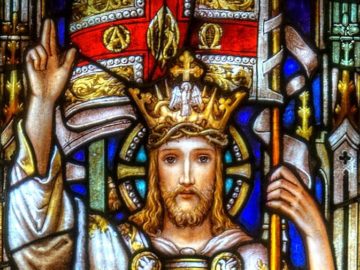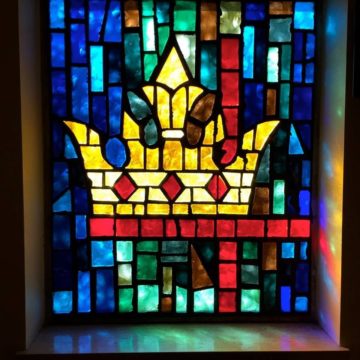Franciscan Friar Fr. Paul Gallagher reflects on the Gospel for Our Lord King of the Universe, November 20, 2022. The content is edited by Franciscan Sister of Christian Charity Sister Anne Marie Lom and Joe Thiel. The excerpts from the Sunday readings are prepared by Joe Thiel. To read or download the complete pdf with excerpts for your prayer, please click here: Franciscan Gospel Reflection November 20 2022. Excerpts are from the Lectionary for Mass for Use in the Dioceses of the United States of America, second typical edition © 2001, 1998, 1997, 1986, 1970 Confraternity of Christian Doctrine, Inc., Washington, DC. Used with permission. All rights reserved. No portion of this text may be reproduced by any means without permission in writing from the copyright owner.
 Luke 23: 35-43
Luke 23: 35-43
The people stood by and watched; the rulers, meanwhile, sneered at Jesus and said, “He saved others, let him save himself if he is the chosen one, the Messiah of God.” Even the soldiers jeered at him. As they approached to offer him wine they called out, “If you are King of the Jews, save yourself.” Above him there was an inscription that read, “This is the King of the Jews.”
Now one of the criminals hanging there reviled Jesus, saying, “Are you not the Messiah? Save yourself and us.” The other, however, rebuking him, said in reply, “Have you no fear of God, for you are subject to the same condemnation? And indeed, we have been condemned justly, for the sentence we received corresponds to our crimes, but this man has done nothing criminal.” Then he said, “Jesus, remember me when you come into your kingdom.” He replied to him, “Amen, I say to you, today you will be with me in Paradise.”
Background:
This may seem like a strange text for the feast of “Christ the King.” The people, the rulers, the soldiers, and even one of the criminals hanging on a cross all ridicule Jesus. From their point of view Jesus appears to be just another pathetic Jew caught in the Roman system of justice. He hangs on a cross with his crime posted so that those passing can ridicule him. He is a reminder to everyone of what happens to those who challenge the authority that the Roman governors and soldiers were there to enforce. But as is often the case in scripture, the statement made in ridicule reveals the reality of Jesus, not just a king, but The King.
Jesus does not respond to any but the criminal, who first testifies to Jesus’ innocence and then requests that Jesus remember him when he comes into his kingdom. Jesus promises to honor his request. In this gesture of compassion Jesus reveals the authority that is his. The rest of the bystanders with their expectations for the Messiah, the Son of God, and Christ the King remain blinded to the reality of who Jesus really is.
This gospel text also reveals how Luke has developed his gospel, for those who might like to reflect more deeply and appreciate Luke’s understanding of Jesus as King. It will be helpful to become familiar again with Luke’s description of Jesus’ temptation in the desert (Luke 4:1-13):
 Filled with the Holy Spirit, Jesus returned from the Jordan and was led by the Spirit into the desert for forty days, to be tempted by the devil. He ate nothing during those days, and when they were over he was hungry. The devil said to him, “If you are the Son of God, command this stone to become bread.” Jesus answered him, “It is written, ‘One does not live by bread alone.'” Then he took him up and showed him all the kingdoms of the world in a single instant. The devil said to him, “I shall give to you all this power and their glory; for it has been handed over to me, and I may give it to whomever I wish. All this will be yours, if you worship me.” Jesus said to him in reply, “It is written: ‘You shall worship the Lord, your God, and him alone shall you serve.'” Then he led him to Jerusalem, made him stand on the parapet of the temple, and said to him, “If you are the Son of God, throw yourself down from here, for it is written: ‘He will command his angels concerning you, to guard you,’ and: ‘With their hands they will support you, lest you dash your foot against a stone.'” Jesus said to him in reply, “It also says, ‘You shall not put the Lord, your God, to the test.'” When the devil had finished every temptation, he departed from him for a time.
Filled with the Holy Spirit, Jesus returned from the Jordan and was led by the Spirit into the desert for forty days, to be tempted by the devil. He ate nothing during those days, and when they were over he was hungry. The devil said to him, “If you are the Son of God, command this stone to become bread.” Jesus answered him, “It is written, ‘One does not live by bread alone.'” Then he took him up and showed him all the kingdoms of the world in a single instant. The devil said to him, “I shall give to you all this power and their glory; for it has been handed over to me, and I may give it to whomever I wish. All this will be yours, if you worship me.” Jesus said to him in reply, “It is written: ‘You shall worship the Lord, your God, and him alone shall you serve.'” Then he led him to Jerusalem, made him stand on the parapet of the temple, and said to him, “If you are the Son of God, throw yourself down from here, for it is written: ‘He will command his angels concerning you, to guard you,’ and: ‘With their hands they will support you, lest you dash your foot against a stone.'” Jesus said to him in reply, “It also says, ‘You shall not put the Lord, your God, to the test.'” When the devil had finished every temptation, he departed from him for a time.
As Luke describes the temptation of Jesus, he portrays Jesus as being faithful to God where Adam had failed. By eating the fruit of the forbidden tree, Adam lost his status as the son of God (Genesis 3:1-7), but Jesus refused to turn stones into bread for food even though he had not eaten for forty days. In the creation story, Adam had been given dominion over all (Genesis 1:26-30), but he still longed to be like God (Genesis 2:17; 3:19). In the second temptation, the devil offers Jesus power over the whole world, but he chooses to be subject to God’s will for him. In the garden, Adam is told that if he eats of the fruit he will not die. In the desert, the devil says that if Jesus throws himself off the temple, he will not die but be rescued by angels. Most important here is the last line of the above text: “When the devil had finished every temptation, he departed from him for a time. Although not directly mentioned, Luke is describing Jesus in these final hours as having the temptations again that he experienced in the desert. Like those of the desert, the temptations here are based on Jesus’ relationship to God: “If you are the Christ of God, the chosen one…” Both here and in the desert, Jesus is tempted to escape death. Those who oppose him propose that because he is the “Son of God” he should not have to die. But Jesus, because he is the faithful Son of God, is obedient to the will of God even to death, death on a cross. His obedience is life-giving, and it affects God’s relationship to the whole world, just as Adam’s disobedience affected God’s relationship to creation.
In celebrating Jesus as King, the church uses a familiar image, in way that expresses spiritual reality. This reality is more significant for Christians than the importance of earthly kingdoms that are based in power over another. Jesus opts for a surrender of power so that the power of God can be revealed. The reality of this kingdom here on earth is revealed in the person of Jesus here in Luke’s gospel and Luke’s Acts of the Apostles. It is also made real for us in the lives of holy men and women who have faced the powerful with the same spirit of Jesus’ surrender here and changed the world forever.
Reflection Questions:
- Use whatever skill God has given to you and the materials at your disposal and draw your image of Christ the King. Give yourself to this image as fully as you are able. (If you are tempted to actually do a drawing, please do not read the last question until you have made a drawing.)
- What are your favorite church buildings? What about each of them makes them fitting structures for you to be in as you celebrate today’s feast?
- Why do you think the Church has chosen this text for our reflection on this feast of Christ the King?
- In our text, Jesus is given the titles “Messiah” and “King of the Jews.” The criminal referred to Jesus as “this man.” What are some the ways you refer to Jesus in your own personal prayer? What do those “titles” say to you about your relationship with Jesus?
- Jesus did not respond to most of the people in the text. Do you ever feel like you are praying or even calling out to God but there seems to be no response? Does this text give you any insights?
- How does your drawing speak to the type of God you relate to in your prayer? Is your picture that of the God/King that is revealed in the gospel text for today? Where are you in your drawing? Does the drawing speak to you of aspects of God’s relation to you or the world that were not apparent to you?


